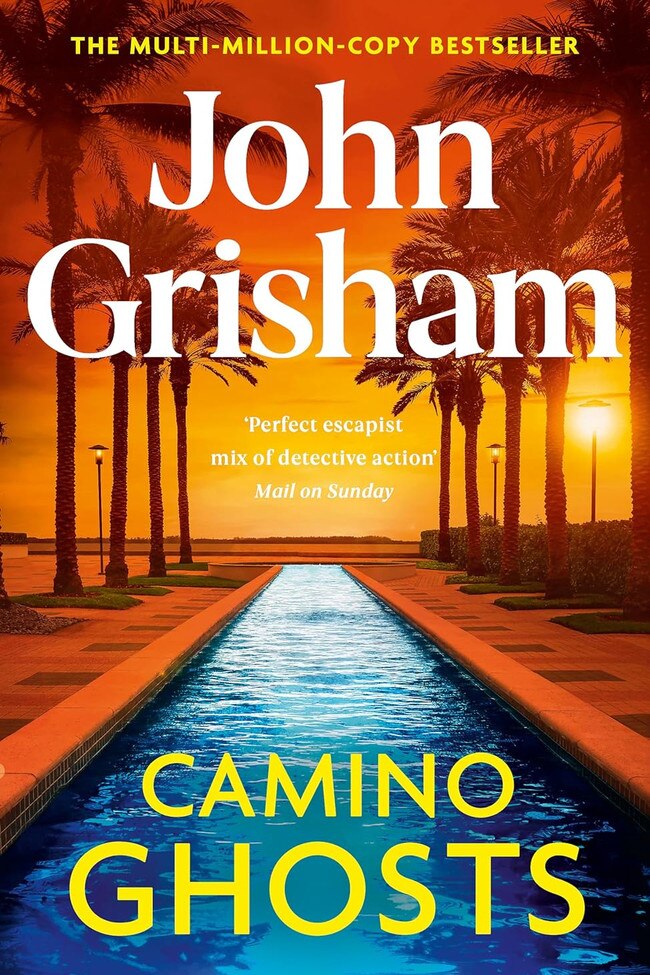John Grisham gets even with literary snobs
You wouldn’t think that a bloke who has written 37-in-a-row No.1 fiction bestsellers and sold 300 million copies worldwide would bother to justify his style.

I don’t choose the books I review. The editor does. And surprisingly that has turned out well for me. I have been introduced to some works and authors I might never have read, including airport books, works that literary critics often call “unputdownable” and “rattling good yarns”.
In my pretentious youth I always took this to mean these were works of craft rather than of literature and snobbishly my younger self would never read them until, once trapped by a snowstorm at Denver airport in Colorado, I read John Grisham’s The Firm.
It might have been a slight delirium induced by Denver’s famous one-mile-high elevation or else I had sticky fingers from opening bottles of the too-lively local Coors beer, but somehow I really did find the book “unputdownable”.

This winter, I returned to the easy brevity of Grisham, when the editor suggested I read and review Camino Ghosts.
It seemed a fairly effortless task, for which I set aside the shortest day of the year. A bitter southerly was blowing across four thousand unbroken kilometres of steep grey sea between my Tasmanian beach house and the Antarctic ice. This was surely the most suitable setting to read a book set in high summer on an island off the sub-tropical Florida coast.
Grisham’s lead female character, a newlywed academic author Mercer Mann, discovers a long-lost 250-year-old historical account of slavery, voodoo and skullduggery, called The Dark History of Dark Isle. Just like most authors would, she planned to steal it:
“Short direct sentences, only a few commas. Certainly no literary flourishes… Mercer quickly set aside her rather snotty editorial and professorial thoughts and got lost in it…. the writing and storytelling were more interesting than most of the hyped debut novels she’d read in the past year.”
Perhaps Grisham digresses here only to get square with all the literary snobs out there. (Not me any longer but maybe you). You wouldn’t think that a bloke who has written 37-in-a-row No.1 fiction bestsellers and sold 300 million copies worldwide would bother to justify his style.
In any case, the story in the soon-to-be-stolen book is about a slave ship that has been wrecked at sea. A few survivors are cast away on the beach of Dark Island. Over centuries their descendants will depart the island, leaving behind an undying curse. A torment will plague today’s rapacious Florida property developers whom we soon learn possess all the human decency of the old-time slavers. They plan a giant casino, to sit in the middle of the island, with a music hall to seat five thousand and at least that many slot machines. To the south of the casino is yet another 18-hole golf course, “every fairway was lined with luxury homes and condos”.
There’s much worse to come but you get the fearful prospect, only too well understood by all Australians in unspoiled regional coastal communities everywhere.
The author doesn’t have to say it, but he echoes Joseph Conrad: “The horror. The horror.”
There’s more than a touch of Heart of Darkness when the developers try to enter the hostile island wilderness, where they die horribly.
Even after 250 years, voodoo has the power to get even.
The involuntary colonisation by the shipwrecked Africans is at the heart of Grisham’s compelling and dark tale.
It’s a yarn that doesn’t seem to pale for lack of adjectives. This brief description of day one for the castaway slaves does not take any time to linger:
“The ocean was calm, still, flat as glass, with no trace of its fury only hours earlier. On the horizon a small orange ball appeared and began to grow as the sun rose for another day.”
Just keep turning the pages. No need to worry about the absence of literary flourishes in this book, nor lament those literary giants like Kafka, William Blake and Herman Melville who died with not a penny between them. Grisham, by contrast, has recently built a $3.8m baseball field on his sprawling farm at Charlottesville in lovely rural Virginia. He’s reportedly worth $400m and is still busy writing five days a week.
I can’t readily give you a Melville sunrise to measure against the one from Grisham. But here’s a sunset:
“The warm waves blush like wine. The gold brow plumbs the blue. The diver sun, slow-dived from noon, goes down, my soul mounts up!
She wearies with her endless hill.
Is then the crown too heavy that I wear.”
I can’t really recommend Moby Dick for a quick read, espeically not on the shortest day of the year. Grisham’s book will much better fit the brief hours. My younger self still insists that his work is craft and not literature. But he is also a bloody good read. It is the plain and simple writing that drives the compelling narrative, which in turn fires up the huge Grisham literary sales machine.
Would old Herman Melville have taken prodigious financial riches in place of the vaunted and eternal literary fame which Grisham will probably never achieve? Probably not. But no matter. I was most grateful to be so well entertained on a short and cold winter day.
What more can a casual reader ask?
Charles Wooley is a writer, broadcaster and reader who dwells near a remote Tasmanian beach.







To join the conversation, please log in. Don't have an account? Register
Join the conversation, you are commenting as Logout